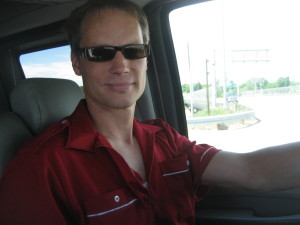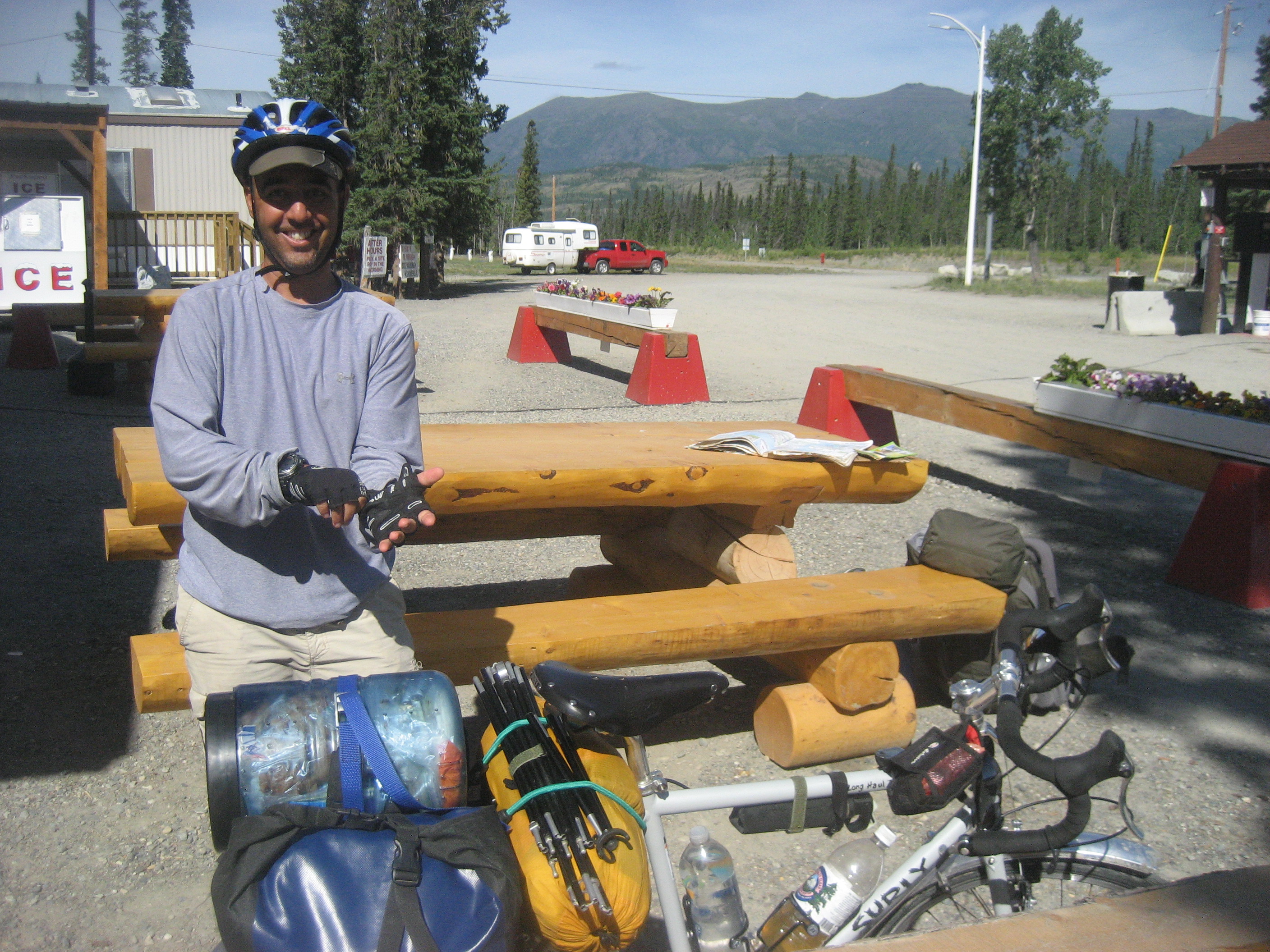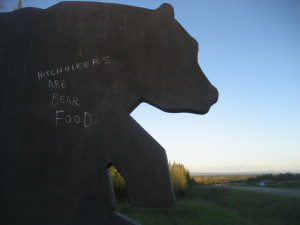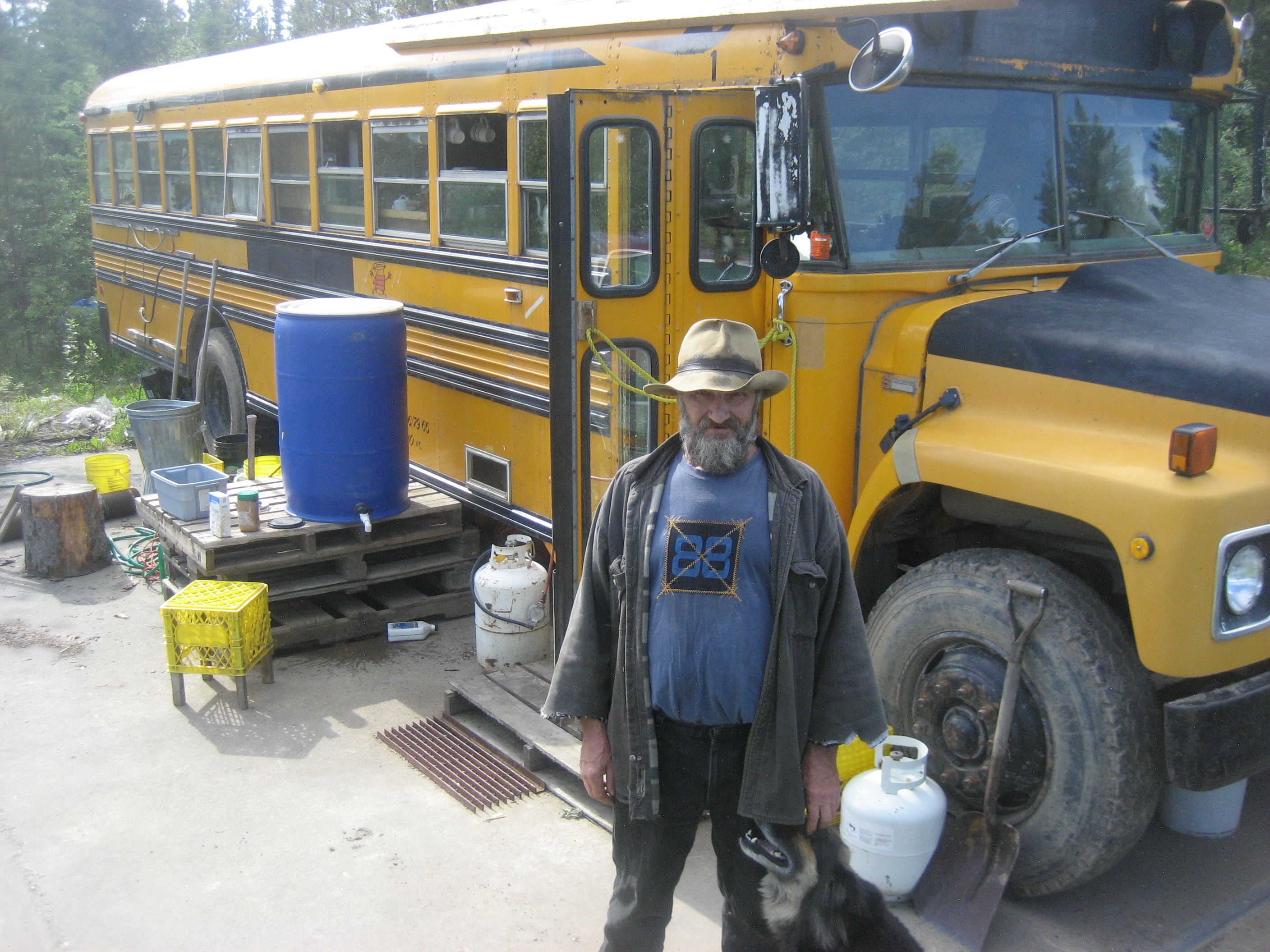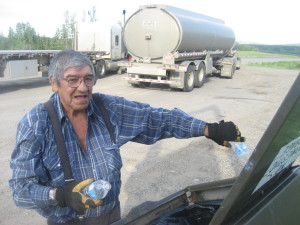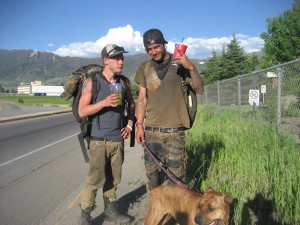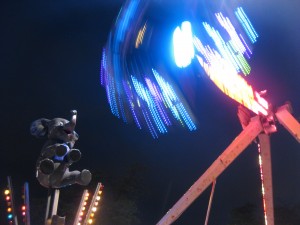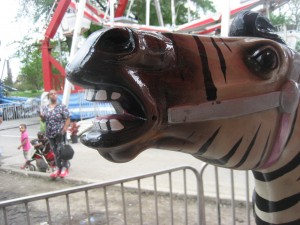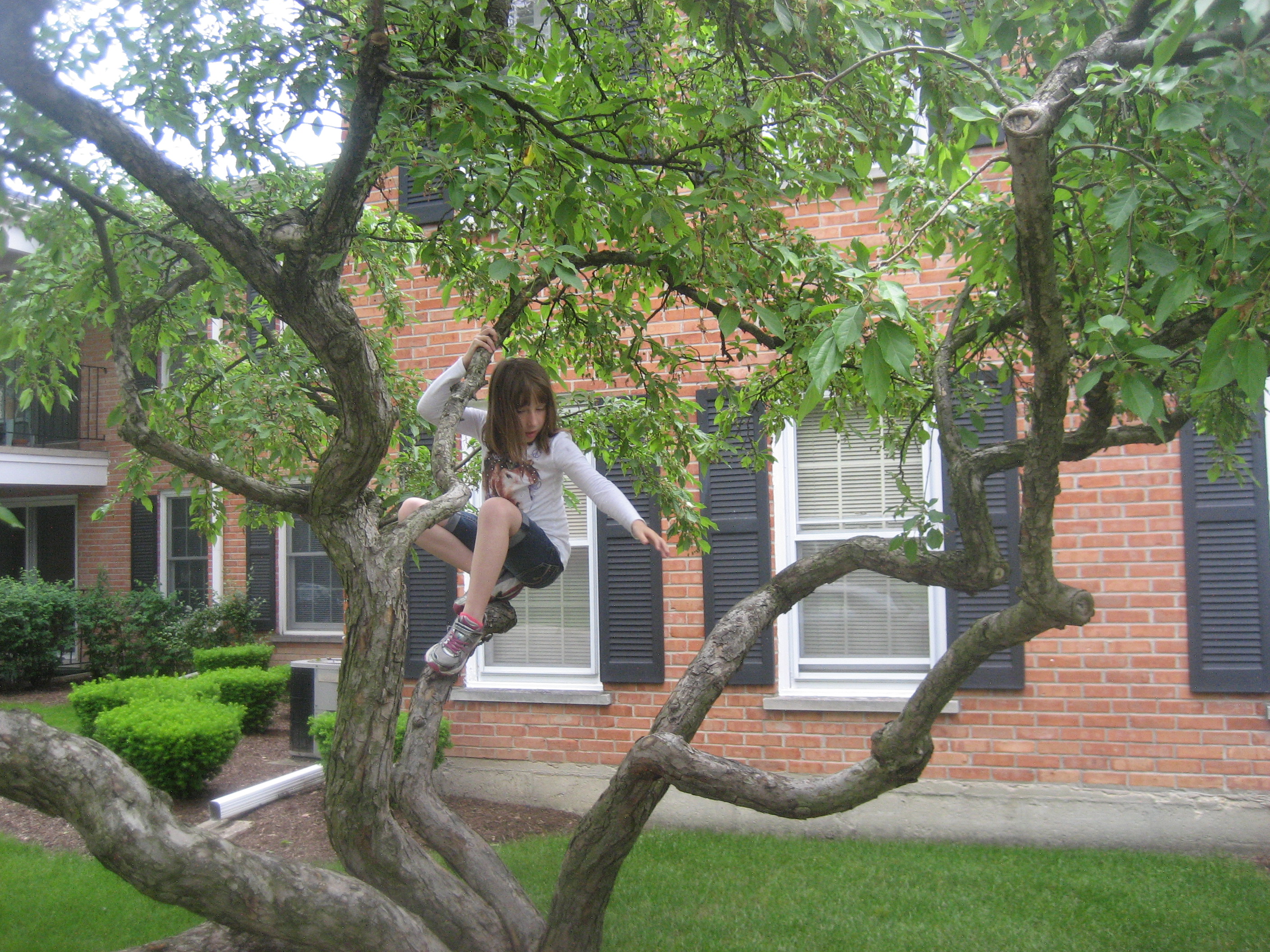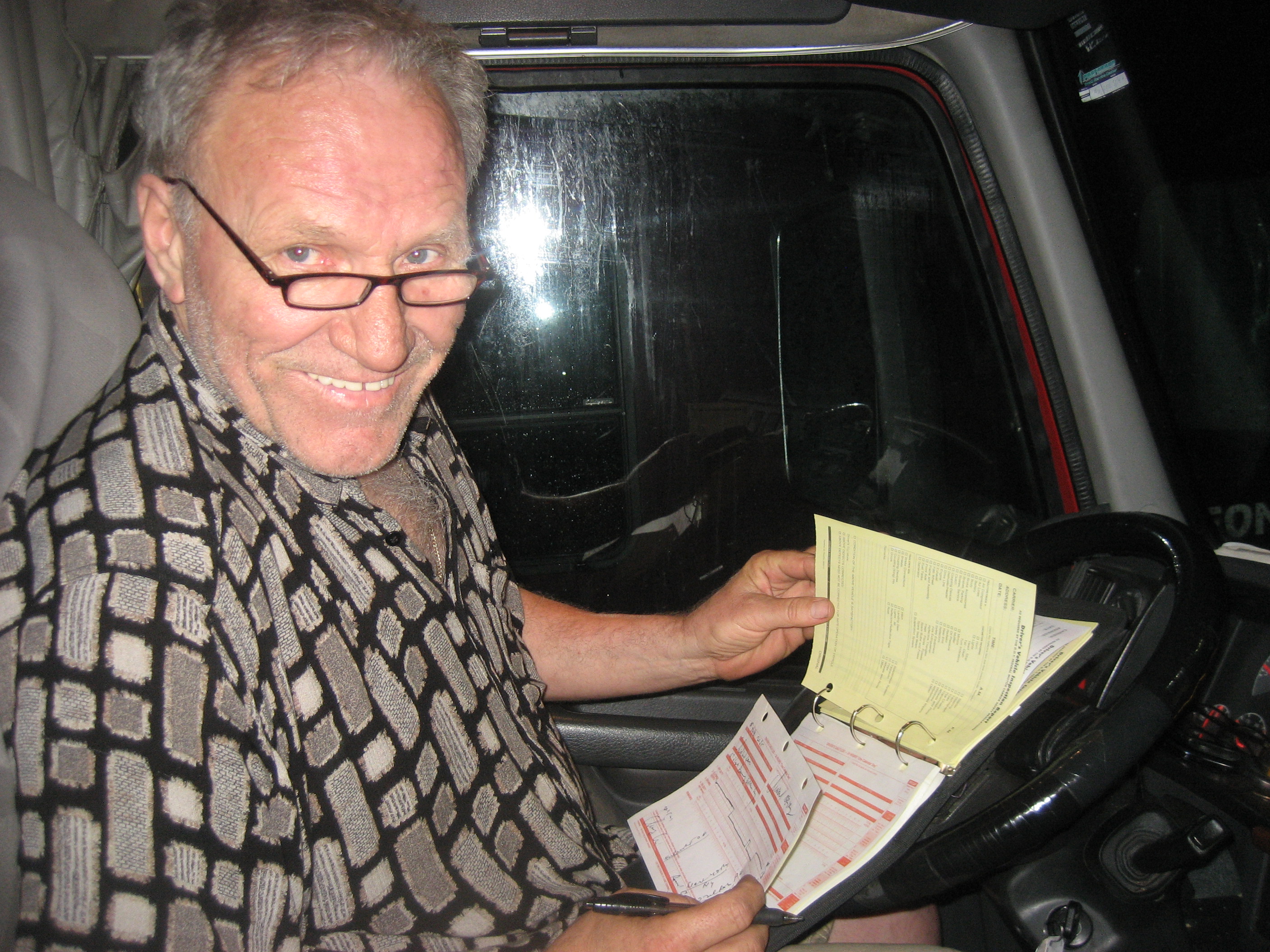
Bosnian refugee to American trucker, Mesud Ceura fills out his time sheet.

Gimmick the Clown, John Lee the Magician or Mr. Schneider the trucker, he makes balloon animals at truck stops across the country.
“In the real dark night of the soul it is always three o’ clock in the morning, day after day.”
F. Scott Fitzgerald
In this morning’s version of Edward Hopper’s “Nighthawks,” the diner is a Gary, Indiana truck stop and the patrons are cross-country truckers.
TA and Pilot signs stand high like neon palm trees over a nighttime oasis, as I-94 trucks roll by like a never-ending, low-throated Tuvan throat song.
Cross-country truckers and night-shift workers prowl. The stadium-sized parking lots are door-to-door 18-wheel trucks. Deep pools of water sit in the lots after a day of rain.
It’s a cold, sublime 3 a.m., and I’m tired after spending the last 24 hours hitchhiking rides in trucks – 850 miles from western Pennsylvania. Earlier this month I hitched from a San Francisco carnival to a New Jersey carnival.
I’m alone in a Subway listening to the store radio play Lou Rawls singing “Late in the midnight hour, you are going to miss my lovin’”
From the gas pumps looking in, you would see me alone, my face lit by a laptop computer. I’m working all night because it is too cold to sleep outside.
When the sun comes up, I’ll get a ride to the Southside of Chicago with hopes of working a traveling carnival kiddy ride tonight – an exhausted, dirty, messy gift to my daughter.
Two good rides, two notebooks
On Tuesday morning I decided to hitchhike from my traveling carnival in Westchester County, New York to Chicago for the birthday of my eight-year-old daughter.
I need to live on the wages made during my year working in traveling carnivals and writing on www.EyesLikeCarnivals.com A call to a carnival in Chicago and I was hired over the phone Tuesday morning.
Hitchhiking in rural New York was extremely depressing, as I was stopped by one state trooper and five local cops inside of two hours. Hitchhiking is illegal “everywhere” in New York State, they said, warning me about heavy fines and jail time.
They suggested I return to New York City or walk out of the state.
I found a way around the cops on Tuesday afternoon and Wednesday. I took a video of riding on the flat bed of a pick-up truck. I took pictures of drivers with the best yarns.
Yet each driver seemed to just be getting started on their life stories when the rides ended and I was left standing there watching book chapters drive down the road.
However, yesterday I had just two truck rides from the Scranton, PA. area to Gary, IN..
During those two long rides I learned enough about truck drivers Mesud Cevra and David Lee Schneider to fill two pocket notebooks. I stayed the night in the upper bunk of Cevra’s cab when we both became sleepy on an overnight drive through Pennsylvania.
Both drivers want to write books about their lives, of dramatic escapes, fiery accidents and wisdom gained from driving millions of miles in America.
Muslim priest, war refugee, American trucker
Mesud Cevra survived two assassination attempts; swam a river to hide from the army; survived a concentration camp and, despite being Muslim, he once posed as a Catholic priest to illegally cross an E.U. border.
Following the break-up of the former Yugoslavia, the Bosnian war from 1992 to 1996 killed an estimated 100,000 people. “Ethnic cleansing” and reports of mass rapes, NATO intervened with bombings.
Cerva came out of that hell with his family to the United States in 1997, with just $2,000 in his pockets. He now owns his own truck. In his early 60s, he’s thinking of buying two more.
He considers himself an American success story, in part, because his son and daughter are thriving. Nerina Cevra is a prominent international law attorney. His son, Omer, is a published poet and political commentator who is working on a movie deal about his days in a concentration camp with his father.
Yet talk of the war can still bring tears to Cerva as he talks about those days, so real even now.
Cevra was working on his laptop at a Pilot truck stop outside Scranton, PA., this week when I struck up a conversation with him. Dusk had just come and I was getting ready to spend the night in an all-night Subway.
When I mentioned I spent the early and mid-1990s in Budapest, Hungary a bridge opened up.
A bridge is also the most architecturally distinct feature of Cevra’s hometown, Mostar, Bosnia. The most prominent city in Bosnia-Herzegovina, Mostar’s main architectural feature was its high bridge over the Neretva River, an example of 16th Century Muslim architecture. During the war, the bridge was blown up.
Cevra and his family were among the 2.2 million people displaced during the war.
A rock-n-roll enthusiast and guitar player, Cevra began his anti-communist activism early in life with his choice of Western music. He said he went on to run for parliament and speak out for democratic reforms during a time when many such activists were killed or imprisoned.
“Everyone from Belgrade, Zagreb and Sarajevo knew I had this music,” said Cevra, who got his albums sent to him by an L.A. Disco club owner. “It was dangerous to listen to Rock n’ Roll music at that time … I got arrested for it.”
Cevra was eventually imprisoned for his political activities for 11 days during the war. But his father, mother, siblings and cousins also were imprisoned. He blames the Dretclj camp for his father’s death soon after being released.
“Many people (imprisoned),” he said. “They killed a lot of people. Eleven days seemed like 11 years. I heard a lot of screaming going on in the next room.”
After escaping to Munich, Germany, he remembers seeing a TV show of prison camps in Bosnia and Croatia. Then he noticed his mother in the crowd of people being filmed by CNN in a camp.
“It hurt so much when I saw my mother there like that and because I couldn’t help,” he said.
During the chaos of the war, he was able to spirit his son out of the country by hiding him underneath his bus chair. But after his 15-year-old daughter defected to Italy during a handball tournament tour, he lost track of her for two years.
A tall and physically strong man, with blue eyes and white-gray hair, Cevra, nonetheless gets emotional when talking about those long periods of separation from his daughter
“It was war, so I didn’t know nothing about her. I heard she could have been in Croatia,” Cevra said “It was a terrible time for me. It was a terrible time for me.”
He again wipes tears from his eyes. For several false starts, he cannot speak without tears for the tragedies of Mostar.
It’s a different place these days, he says as he lightens up. He may retire there.
“What am I?” he says. “I’m a refugee from Bosnia who has been fighting to make a living for 10 years. I didn’t know my children would turn out like this (successes). Now, they are like my right hand and my left hand.”
He estimates he has driven about 2 million miles since coming to America and he has some opinions about this land. Americans work too hard, he says. Oil companies control too much.
“I love the freedom,” he said. “Ninety percent of the Americans I meet are honest people … I think people are very happy. I see people with no money but are happy.”
Animal balloon maker, magician and trucker
John Lee Schneider opened the front, passenger-side door of his 18-wheeler and un-inflated balloons poured out on to the parking lot.
I’d just gotten off a ride from eastern Pennsylvania to Toledo, Ohio with Cevra and Schneider promised to get me to Chicago.
Balloons, however, begged for answers.
Schneider isn’t just a truck driver, he’s a magician and a clown too.
In addition to driving 100,000 miles a year or more as a long-distance truck driver, he stops at truck stops and makes balloon animals for “kids and waitresses.”
“I see a family in a truck stop and I’ll go up to the kids and ask if they can have a balloon,” says the former 101st Airborne Division, Vietnam Veteran. “A waitress might sit down next to me and I’ll make them a puppy. Then they’ll show it around … I’ve had a family buy me a meal.”
Truck stop after truck stop, Schneider makes giraffes, elephants and assorted animals for kids.
“I love entertaining people,” he said as he drove through the night. “If wasn’t for people I wouldn’t be here … Or I’d have to entertain the animals.”
Schneider already has attained a bit of notoriety as as Gimmick (a clown) and as David Lee The Magician.
In the 1970s, he was doing a fiery cage escape trick in Sheboygan, Wisc., when a NBC affiliate taped him catching fire. He made CNN news and TV Guide.
He says he became such a celebrity he moved to Hilbert, Wisc. and changed professions.
“I couldn’t go nowhere without people stopping me for autographs,” he said. “But now I’m known as the balloon man in a lot of truck stops.”
Still, like so many people, Schneider has still more sides. He calls himself a “fundamentalist” or “independent” preacher. He’s also an outdoors man who loves bow hunting and fishing.
At 57 years old, he plans on retiring in five years and going back to the garage to dig out Gimmick and David Lee.
Until then, “kids and waitresses” at truck stops across the country can count on animal balloons to lighten the load.
